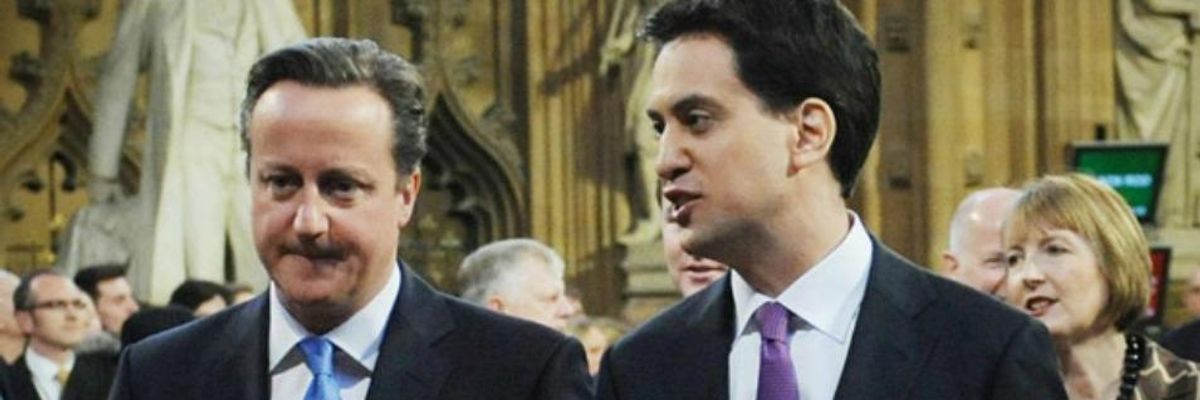

SUBSCRIBE TO OUR FREE NEWSLETTER
Daily news & progressive opinion—funded by the people, not the corporations—delivered straight to your inbox.
5
#000000
#FFFFFF
To donate by check, phone, or other method, see our More Ways to Give page.


Daily news & progressive opinion—funded by the people, not the corporations—delivered straight to your inbox.

Prime Minister David Cameron and Labour party leader Ed Miliband face off on Thursday in one of the tightest elections in decades. (Photo: PA)
Voters in the United Kingdom went to the polls on Thursday in the tightest election in decades as Prime Minister David Cameron faced off with the Labour party's Ed Miliband.
"This race is going to be the closest we have ever seen," Miliband told supporters on Wednesday night. "It's going to go down to the wire."
Final opinion polls showed the Conservative party on track to receive 274 seats in Parliament, compared to Labour's 271, which indicates that neither will win the 326 required for a majority--an outcome that could politically destabilize the nation.
As Reutersexplains:
If neither party wins an overall majority, talks will begin on Friday with smaller parties in a race to strike deals.
That could lead to a formal coalition, like the one Cameron has led for the past five years with the centrist Liberal Democrats, or it could produce a fragile minority government making trade-offs to guarantee support on key votes.
Additionally, the election may give further momentum to Scottish separatists, who in September rejected a vote for independence. As Common Dreams reported on Wednesday, "The separatist SNP, just months after its loss in an independence referendum, has quadrupled its membership, and could, according to one recent poll, win every single one of the 59 Scottish seats available in the election."
The Guardian is providing live updates of the election here.
Trump and Musk are on an unconstitutional rampage, aiming for virtually every corner of the federal government. These two right-wing billionaires are targeting nurses, scientists, teachers, daycare providers, judges, veterans, air traffic controllers, and nuclear safety inspectors. No one is safe. The food stamps program, Social Security, Medicare, and Medicaid are next. It’s an unprecedented disaster and a five-alarm fire, but there will be a reckoning. The people did not vote for this. The American people do not want this dystopian hellscape that hides behind claims of “efficiency.” Still, in reality, it is all a giveaway to corporate interests and the libertarian dreams of far-right oligarchs like Musk. Common Dreams is playing a vital role by reporting day and night on this orgy of corruption and greed, as well as what everyday people can do to organize and fight back. As a people-powered nonprofit news outlet, we cover issues the corporate media never will, but we can only continue with our readers’ support. |
Voters in the United Kingdom went to the polls on Thursday in the tightest election in decades as Prime Minister David Cameron faced off with the Labour party's Ed Miliband.
"This race is going to be the closest we have ever seen," Miliband told supporters on Wednesday night. "It's going to go down to the wire."
Final opinion polls showed the Conservative party on track to receive 274 seats in Parliament, compared to Labour's 271, which indicates that neither will win the 326 required for a majority--an outcome that could politically destabilize the nation.
As Reutersexplains:
If neither party wins an overall majority, talks will begin on Friday with smaller parties in a race to strike deals.
That could lead to a formal coalition, like the one Cameron has led for the past five years with the centrist Liberal Democrats, or it could produce a fragile minority government making trade-offs to guarantee support on key votes.
Additionally, the election may give further momentum to Scottish separatists, who in September rejected a vote for independence. As Common Dreams reported on Wednesday, "The separatist SNP, just months after its loss in an independence referendum, has quadrupled its membership, and could, according to one recent poll, win every single one of the 59 Scottish seats available in the election."
The Guardian is providing live updates of the election here.
Voters in the United Kingdom went to the polls on Thursday in the tightest election in decades as Prime Minister David Cameron faced off with the Labour party's Ed Miliband.
"This race is going to be the closest we have ever seen," Miliband told supporters on Wednesday night. "It's going to go down to the wire."
Final opinion polls showed the Conservative party on track to receive 274 seats in Parliament, compared to Labour's 271, which indicates that neither will win the 326 required for a majority--an outcome that could politically destabilize the nation.
As Reutersexplains:
If neither party wins an overall majority, talks will begin on Friday with smaller parties in a race to strike deals.
That could lead to a formal coalition, like the one Cameron has led for the past five years with the centrist Liberal Democrats, or it could produce a fragile minority government making trade-offs to guarantee support on key votes.
Additionally, the election may give further momentum to Scottish separatists, who in September rejected a vote for independence. As Common Dreams reported on Wednesday, "The separatist SNP, just months after its loss in an independence referendum, has quadrupled its membership, and could, according to one recent poll, win every single one of the 59 Scottish seats available in the election."
The Guardian is providing live updates of the election here.